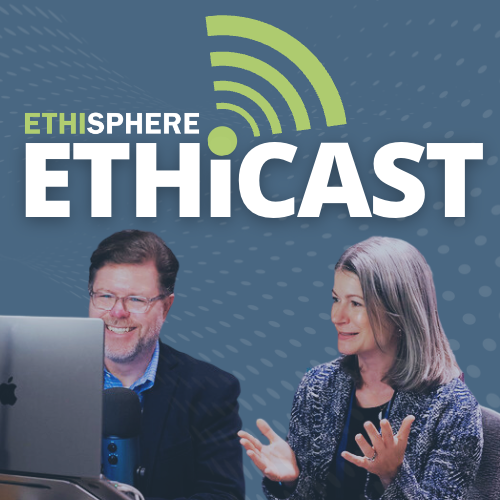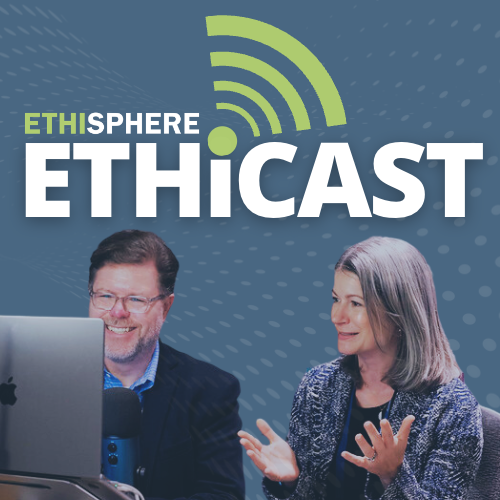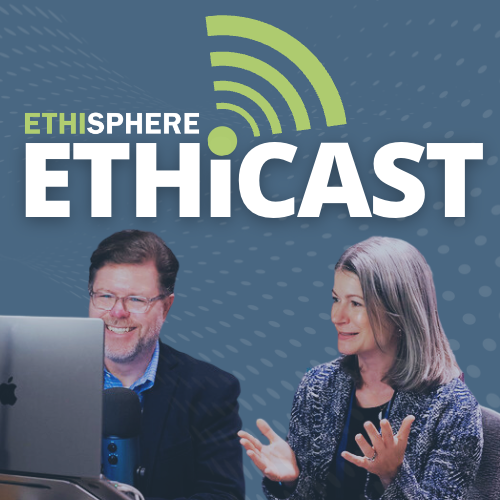[00:00:00] Speaker A: Hi, everyone. Today we'll talk about why running recurring culture assessments builds immense value for your organization. I'm your host, Bill Coffin, and this is the Ethicast Ethical culture matters to employees, investors, and most of all, stakeholders. Case in point, this year's ethics premium is 12.3%. That's the amount by which the publicly listed honorees of the 2024 World's Most Ethical companies outperformed a comparable index of global companies from January 2019 to January 2024. What's the one thing that unites them all? A terrific culture of ethics.
Now, metrics like that don't just underscore the value of ethical culture. They also make the case for performing organizational culture assessments to see where a culture's true strengths and improvement opportunities might be. But culture assessments are not a once and done thing, which raises the question, how often should you assess your culture?
With us today to answer that question is Curtis Light, senior culture analyst at Ethisphere. Curtis, thanks so much for joining us and thank you for returning to the show.
[00:01:11] Speaker B: Absolutely. Great to be back, Bill.
[00:01:14] Speaker A: Why does it matter for organizations to undergo culture assessments on a recurring basis?
[00:01:18] Speaker B: When you think about a culture assessment, usually surveys, those are really a snapshot in time of how your employees are feeling about different programmatic elements in that moment. And there's a lot of factors that go on in that moment, internally in your organization, externally, and then also the action plans of your ethics and compliance department that, that change the landscape of how people might be feeling. So it's important to measure at a periodic basis to see how you're improving and really create a journey of improvement and not just a monolithic effort. In the recent ECCP updates, we saw language around how and how often organizations measure ethical culture. And so there's kind of a continued and more focused point on how often on this recurring measurement. So when we're thinking about how you decide when to measure, how often you measure, there are lots of things to consider and we'll get into some of those. But the key here is you want to be able to measure how your actions are affecting the ethical culture over time. And also are there external factors that might be affecting your ethical culture and comparing those year over year, maybe every two years, something along those lines. Just to give you a couple data points, when we look at the world's most ethical companies, honorees, 96% of those honorees do some sort of ethical culture survey at least every two years.
Only 4% are doing that at some sort of less than two year or ad hoc basis. So we're really seeing the best in the ethics and compliance space. Measure on a regular basis every year is the most common. 49% of WMEC honorees measure at least yearly. So it's so important because you can really see the directionality of how your employees are feeling over time when you're.
[00:03:21] Speaker A: Determining a culture assessment cadence. What are some of those key considerations that organizations should keep in mind?
[00:03:26] Speaker B: There's a few things bill internally in your organization and then some things to consider that are external or just factors in the lives of the employees. So let's start with the internal things. So it's important to look at what your corporate calendar looks like, what other things are going on in the organization, particularly things like other surveys. Those come to mind first. That's a thing that a lot of organizations look at.
You certainly, if you can avoid it, want to not be surveying through two different surveys at the same time. So think engagement surveys at the same time as a dedicated ethical culture survey. But also there's some less thought of things in here. So busy seasons versus slow seasons if you have a seasonal business organization. Also big changes in the organization if you can avoid them, sometimes you can't. So things like reductions in force, changes in senior leadership, timings of key training, anything that's going to take the attention of employees away. Some organizations, they look at that calendar and maybe they want to do an every other year. So one year they have their engagement survey just by itself and maybe a couple pulse surveys or other things that they measure and then the following year they do both an engagement and a full fledged culture survey. So it really kind of depends on how tight that corporate calendar is, the appetite from stakeholders and senior leadership from for another survey. So that's certainly things to consider. But then when you think about time of year, that's when we get into do you have a busy time of year? Are there big events coming up on the corporate calendar or changes that you can avoid that are going to take attention away from your effort that are going to hurt your response rate. Now, switching gears a little bit, if we look at things outside of your organization, some of these may be obvious, but they're certainly good to note. Things like major holidays.
If you have a truly global organization, it can be hard to avoid all of those. There's some sort of celebration or thing going on pretty much around the world all the time.
But it's important to avoid those major holidays, at least for your kind of big pockets of your employee population. And then also popular Vacation times. So if you have a large chunk of your workforce that's taking vacation during the summer can be something to avoid. But it's so different from organization to organization.
The key thing here is maybe you look at all these factors and you're determining, okay, we want to survey every year, but what time of year do we want to survey? Maybe there is no perfect time.
The point here is to not get discouraged. Find a good time. It doesn't have to necessarily be a perfect time time. It's important to still measure even if you can't find a perfectly quiet time in your corporate calendar. Those generally, for large organizations, don't really exist. There's always something going on.
[00:06:31] Speaker A: Culture assessments never exist in a vacuum. Could you shed some light on what kind of supporting initiatives that ethics and compliance teams should think about when setting up a culture assessment cadence and what their timing should be?
[00:06:43] Speaker B: Yeah, you're right. So often culture surveys, they don't paint quite a full picture. They're a great foundational effort to collect a lot of data and feedback on how your employees are feeling about the elements of your program. But there is opportunity a lot of times to collect qualitative data through some other measurement efforts. And so as you're deciding when to do your main ethical culture survey and kind of collect that big piece of data, you also want to be thinking about there are likely going to be some questions that that data raises. Things that, okay, we have an opportunity here, but I'm not really sure what's causing that opportunity, or maybe there's a peculiar result or something that you want to look into further. So having planned as you're kind of going in, or planning out a year over year, plan some additional efforts like site visits, management interviews, even focus groups can help you fill in those gaps or gather more information from employees on why they're feeling certain ways or why they answered the survey a particular way. So these efforts, you can be a little flexible with the timing of these. It's important to have some flexibility both in the timing and the audience of these, because you want to be reactive to what your survey data tells you. So you won't always know, and often won't know what your survey data is going to raise as opportunities or areas to look further into. But you do want to set aside some resources and some time to do some sort of qualitative or supporting measurement effort. So focus group, site visits, manager interviews, things like that. So typically what we see organizations do is they'll have some sort of regular cadence for these, like they do with their, their ethical culture survey. But then the topics that they measure will vary depending on the risks that they're experiencing. Maybe there's a new risk that's coming up. It could be something from the data in their survey. It could be they are really focusing on a particular area and they want feedback on that. Those action plans that they've already implemented. It's really important to have these efforts planned out, but have some flexibility on the topic year over year. So you want to have the resources ready to do them, but be able to react to new risks, new findings in your data, all those sorts of things.
[00:09:17] Speaker A: When it comes to communicating with respondents post survey, what is best practice there? I mean, how frequently should the comms be and for how long?
[00:09:24] Speaker B: This is a big and very important topic because as we alluded to in the beginning of the episode, there's a kind of a fear of survey fatigue at pretty much every organization, especially from leadership. Are we surveying too much, too little? And we kind of think about survey fatigue as employees aren't necessarily tired of taking surveys. They're just tired of taking surveys where nothing happens based on their feedback. So they're providing all this feedback, but then they don't see anything happen. At a lot of organizations, there are are great actions or changes being made from survey data, but employees just don't know about it because the communication isn't there. So when we're thinking about communication, you want to tailor it to your audience. So certainly you'll communicate to leadership, the board, maybe the audit committee, or combination of those stakeholders. But you also want to consider, and we strongly recommend communicating to people leaders at all levels of the organization. They're really the tide that raises all ships. If you can have them talking with their teams about some of the opportunities or key things that came from the survey, especially as you begin to implement action plans, maybe this is additional communication around particular topics or additional training things of those nature. If you can have management echo that message and relay that to their teams, it can be much more impactful. Looking at the data we have on the world's most ethical companies, 76% of them message around their culture survey data to all people leaders. But then we get even to one level below that where we strongly encourage having some sort of regular messaging post survey to all employees. So when we look at the world's most ethical companies, honorees, 77% of them have a message for all employees.
So that encompasses people at all levels, even your frontline employees. As we talked about with survey fatigue, it's important for them to know both that their voices were heard and that something is being done with the data that they didn't just answer a survey for no reason. So but this message can change between depending on who you're messaging. So for all employees, you can communicate things like high level, hey, here's how we or areas that we did really well. Here's some areas that we're going to work on. And then the next step is to continue to communicate as you kind of action on those opportunities. So maybe it's a new training or additional communication or revising a policy.
And it's important to continually throughout the year tie those actions back to we heard this feedback on the culture survey. Thank you so much. This is something we've implemented based on your feedback. So the cadence, it varies. It depends on all the other communications going out to your employees. Sometimes employees are getting a lot of communication from all sorts of different departments. But the key here is to have something that's regular that ties back to the results from the survey so that people don't feel like their voices fell on deaf ears.
[00:12:42] Speaker A: Well, Curtis, thank you so much for joining us and for coming back to the show. And thank you again also for providing the data and insights around this important topic.
[00:12:50] Speaker B: Absolutely. Thanks for having me, Bill.
[00:12:53] Speaker A: For a wealth of free reports, presentations, webinars and more, visit the Ethisphere resource
[email protected] resources and while you're there, help yourself to a copy of the Eight Pillars of an Ethical Culture, our special report that describes the most important aspects of a culture of integrity, from perceptions of the ethics and compliance function to perceptions of leadership and more. And finally, to connect with the Ethisphere Culture team and learn how you can measure and elevate your organization's culture, please visit ethisphere.com solutions I'm Bill Coffin and this has been the Ethicast. For more episodes, please visit the Ethisphere YouTube
[email protected] ethisphere and if this is your first time enjoying the show, please make sure to like and subscribe on YouTube, Apple Podcasts and Spotify. Thanks so much for joining us. And until next time, remember, strong ethics is good business.


